|
|
|
Sort Order |
|
|
|
Items / Page
|
|
|
|
|
|
|
| Srl | Item |
| 1 |
ID:
089539


|
|
|
|
|
| Publication |
2009.
|
| Summary/Abstract |
The thrust of the article is to investigate the reasons for the ambiguous character and results of the ENP. The argument is that these are a result of tensions inherent in the discourses produced at various sites in the EU that are involved in the development and implementation of the Policy. These tensions result in the simultaneous construction of mutually exclusive types of borders at the external edges of the EU. The main contribution of the present study to this argument is the detailed empirical evidence it provides for these tensions through the examination of the discourse of the European Commission. The article introduces the concept of soft/ hard borders as a very good analytical tool for studying the ENP and conducts a double-reading of the major types of Commission documents related to this Policy. The main finding is that at present some of the main hurdles the ENP is facing are a result of insufficient transformation of the assumptions and routinised practices that guide policy-making. These lead to underlying themes in Commission discourse that preclude the establishment of the necessary soft external border for the EU. Instead they promote the construction of more traditional hard borders.
|
|
|
|
|
|
|
|
|
|
|
|
|
|
|
|
| 2 |
ID:
085830
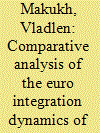

|
|
|
|
|
| Publication |
2008.
|
| Summary/Abstract |
Relations with the European Union within the framework of the European Neighborhood Policy (ENP) are extremely important for the European integration of its partner countries. So researchers can glean something from the experience accumulated in the East European and Caucasian countries' relations with the European Union within the framework of the ENP. This article looks at how a corresponding balance is being found in Ukraine's and the Caucasian countries' relations with the EU based on the results of the European Neighborhood Policy in the Arab Maghreb states (at the EU-Morocco, EU-Tunisia, and EU-Algeria levels).
|
|
|
|
|
|
|
|
|
|
|
|
|
|
|
|
| 3 |
ID:
142631
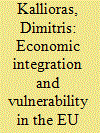

|
|
|
|
|
| Summary/Abstract |
In 2004, the EU launched the European Neighbourhood Policy (ENP), a unified policy framework towards its neighbours in the external EU periphery, aiming at strengthening prosperity, stability and security around its geopolitical borders. However, in-depth empirical analysis provides clear-cut evidence that, while the size and composition of trade flows between the EU and the ENCs may be growing, they are not favourable for the ENCs from the perspective of export diversification, in terms of either products or number of destinations. This condition increases their exposure to volatility in international markets. These results provide valuable insight into economic integration theory and for policymaking.
|
|
|
|
|
|
|
|
|
|
|
|
|
|
|
|
| 4 |
ID:
092500
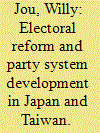

|
|
|
| 5 |
ID:
092152
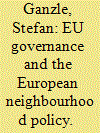

|
|
|
|
|
| Publication |
2009.
|
| Summary/Abstract |
Since 2002 the European Union (EU)1 has sought to flesh out a proximity policy to deal with its immediate vicinity in the light of EU Eastern enlargement. Several labels, such as 'Eastern (and Southern) Dimension', 'Wider Europe', 'European Neighbourhood Policy' (ENP), 'ENP plus' and, eventually-with regards to East European countries outside the EU-'Eastern Partnership' have been used to capture the EU's policy vis-a-vis its different neighbours. So far, Algeria, Israel, the Palestinian Authority, Armenia, Jordan, Syria, Azerbaijan, Lebanon, Tunisia, Ukraine, Egypt, Moldova, Georgia and Morocco have been recognised as 'ENP partner' countries.
|
|
|
|
|
|
|
|
|
|
|
|
|
|
|
|
| 6 |
ID:
099503
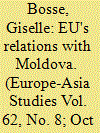

|
|
|
|
|
| Publication |
2010.
|
| Summary/Abstract |
This article examines recent EU-Moldova relations under the European Neighbourhood Policy (ENP) and the Eastern Partnership (EaP) in order to assess the EU's policies and their (limited) effectiveness over the past decade. I draw on the 'external governance approach' and develop the 'partnership as cooperation perspective' to examine which approach prevails in the theory and in the political practice of EU-Moldova relations. Whereas the external governance approach focuses on the expansion of EU rules to assess the effectiveness of the EU's external relations, the partnership perspective draws attention to effective cooperation based on mutual concessions in areas of converging preferences.
|
|
|
|
|
|
|
|
|
|
|
|
|
|
|
|
| 7 |
ID:
142633


|
|
|
|
|
| Summary/Abstract |
Motivated by neoliberal normativism, the ENP drew on a now outdated mix of political and economic reasoning that does not reflect recent scientific evidence on regional development, and is compromised by having been formulated at arms-length from implementing contexts. An expansion of the ENP discourse that builds upon research findings and sustained feedback with field experts in neighbourhood countries is thought to increase the probability of long-term policy success. Rather than trade liberalisation as the primary stimulant, the results specifically suggest innovation support as the default strategy, and migration policy structures to back labour and capital flows.
|
|
|
|
|
|
|
|
|
|
|
|
|
|
|
|
| 8 |
ID:
181009
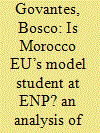

|
|
|
|
|
| Summary/Abstract |
This article focuses on the evolution of the European Union–Morocco relationship during the first years of the European Neighbourhood Policy (ENP). The aim is to show that Morocco has succeeded in developing a privileged relationship with the EU, taking advantage of the particular institutional characteristics of this period, especially under ENP. Considering the European Union (EU) frequently stresses the importance of democracy and human rights’ progress for justifying the quality of the relationship, the research focuses on these topics. Contrarily to what EU suggests, this research found no evidence of progress in these fields. The research equally points out that the EU evaluations of these elements were lenient towards the objective facts that do not show enough progress to support this type of relationship.
|
|
|
|
|
|
|
|
|
|
|
|
|
|
|
|
| 9 |
ID:
148314
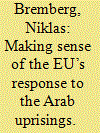

|
|
|
|
|
| Summary/Abstract |
The Arab uprisings of 2011 put into question previously held understandings about the stability of authoritarian regimes in North Africa as well as the European Union’s (EU’s) relations with countries in its southern neighbourhood. Despite early calls on behalf of the EU to change its policies, the Union’s responses in the early stages seemed mostly characterised by continuity. This article claims that certain dispositions and background knowledge developed over several decades vis-à-vis EU’s Mediterranean policies served as a baseline from which EU officials and diplomats acted. Drawing on insights from practice approaches, the article argues that the practical understandings on what the EU can (and cannot) do vis-à-vis partner countries in North Africa create a kind of power politics of practical dispositions. The article focuses on the European Neighbourhood Policy - the EU’s flagship initiative - and builds on a unique set of data that combine policy documents and interviews with about 30 EU officials and national diplomats from before and after the Arab uprisings. In this way, it illustrates how practice relates to change in that even though the EU’s responses drew on an established repertoire of practice, enacting it in a new context opened up new possibilities for action.
|
|
|
|
|
|
|
|
|
|
|
|
|
|
|
|
| 10 |
ID:
138869


|
|
|
|
|
| Summary/Abstract |
The growth of European Union (EU) competences in the field of external security in the last decade has produced a substantial increase in the number of EU institutions and bureaucratic actors engaged in the planning and management of these policies. Moreover, the expansion of competences in such a sovereign sensitive area comes up against the persistent tergovernmental nature of the security sector. This has resulted, on the one hand, in a complex institutional architecture with heavy demands in terms of coordination, and on the other hand, in a stark differentiation and stratification of the legal regimes with a potential to impact on policy outcomes. This state of uncertainty is particularly relevant when looking at relations with countries bordering the Union, as the long-standing web of interactions there has developed a more complex institutional environment. While most of the scholarly literature focuses on single institutional sectors or policies (Common Security and Defence Policy, European Neighbourhood Policy, or the external side of the Area of Freedom, Security and Justice), this study seeks to address the issue with a comprehensive analysis of the institutional framework that has emerged in the last decade, more notably, since the entry into force of the Treaty of Lisbon. The article provides, first, an overview of the EU’s institutional actors responsible for security policies in the regions bordering the EU, and second, an examination of the different mechanisms established to address the coordination issue. Finally, this study will argue that the traditional military dimension is but one, and certainly not the most developed, of the security instruments employed by the EU. At another level, it will be argued that the shift of focus from the military to other security tools has altered the institutional balance in the security sector, substantially adding to the relative influential weight of the Commission.
|
|
|
|
|
|
|
|
|
|
|
|
|
|
|
|
| 11 |
ID:
074575
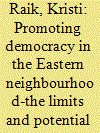

|
|
|
|
|
| Publication |
2006.
|
| Summary/Abstract |
The EU aims to promote democracy in its eastern neighbouring countries through the European Neighbourhood Policy (ENP) launched in 2003. The EU has three types of neighbours in the east: Ukraine, a case of "re-transition"; Moldova, a case of prolonged transition; and Belarus, an outright authoritarian regime. As a result it needs to differentiate between stages of democratisation when designing external support. The ENP has many weaknesses as an instrument for spreading democracy, above all the fact that the conditionality policy included in the ENP is not supported by strong incentives or rewards that would encourage reforms. Some policy suggestions that could make the ENP a more effective tool of democracy promotion include systematic conditionality and an improved mechanism for supporting civil society, in particular pro-democratic groups in authoritarian countries.
|
|
|
|
|
|
|
|
|
|
|
|
|
|
|
|
| 12 |
ID:
099501
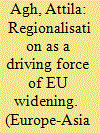

|
|
|
|
|
| Publication |
2010.
|
| Summary/Abstract |
This article focuses on the 'globalisation-cum-regionalisation' process in the European Union that has led to the emergence of functional macro-regions. It provides first a classification of regionalisation, and describes the organisational and mental barriers of the European Neighbourhood Policy (ENP). The second part traces the shift of the ENP from the South to the East that has also activated the EU's pre-accession policy in the West Balkan region and the Eastern Partnership programme. Finally, it argues that the Baltic Strategy and the Danube Strategy as functional macro-regions are the main instruments to overcome the weaknesses of the incentive-based approach in the EU's conditionality (or, as it is described here, its 'carrot crisis').
|
|
|
|
|
|
|
|
|
|
|
|
|
|
|
|
| 13 |
ID:
085465
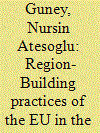

|
|
|
|
|
| Publication |
2008.
|
| Summary/Abstract |
In this paper, the focus will be on the EU's region-building practice in the Mediterranean via an evaluation of the successes and failures of the EMP, ENP and operations under the ESDP. With this aim in mind, some general approaches to region-building and how the Mediterranean is defined will be briefly examined. Drawing on the experiences of the Union on the ground, an assessment will be made as to what the next move of the Union in the Mediterranean will be in order for it to realise the aims stated in the Union's Security Document.
|
|
|
|
|
|
|
|
|
|
|
|
|
|
|
|
| 14 |
ID:
090603
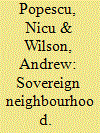

|
|
|
|
|
| Publication |
2009.
|
| Summary/Abstract |
The launch of the Eastern Partnership (EaP) marks the most significant change to the European Neighbourhood Policy (ENP) since it was launched in 2004. In the wake of the Georgia war in August 2008 and yet another gas crisis in January 2009, the EU clearly needs a more constructive policy towards Eastern Europe. But both the ENP and EaP are based on a contradiction. They offer only the remotest possibility of eventual accession to the EU, but are still based on "accession-light" assumptions, applying the conditionality model of the 1990s to weak states that are a long way from meeting the Copenhagen criteria. The priority in the eastern neighbourhood is not building potential members states but strengthening sovereignty, in the face of an increasingly assertive Russian neighbourhood policy. The game is playing the west off against Russia for geopolitical reward.
|
|
|
|
|
|
|
|
|
|
|
|
|
|
|
|
| 15 |
ID:
138867


|
|
|
|
|
| Summary/Abstract |
A multiplicity of legal and political arrangements regulate the European Union's external borders. With borders representing the intersection between national and international law and politics, the EU also acquired some legal competences in this realm. The resulting triple set of rules coincides with the growing disaggregation of the classical functions of borders. This state of affairs generates legal and procedural uncertainties and results in a growing ambiguity and lack of transparency, in terms of competences and accountability. Due to the EU's concerns with transnational terrorism, and the growing securitization of migration, the EU's borders with the states of the Middle East and North Africa are particularly relevant in this regard, with the resulting uncertainties touching upon fundamental rights. This article discusses the conceptual starting point of the growing institutional, legal, and political complexity at the EU's southern borders, together with relevant aspects and developments, thus also providing the background to the different contributions in this special issue.
|
|
|
|
|
|
|
|
|
|
|
|
|
|
|
|
| 16 |
ID:
163656
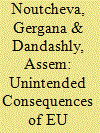

|
|
|
|
|
| Summary/Abstract |
The European Union’s (EU) impact on the political governance of the European neighbourhood is varied and sometimes opposite to the declared objectives of its democracy support policies. The democracy promotion literature has to a large extent neglected the unintended consequences of EU democracy support in Eastern Europe and the Middle East and North Africa. The EU has left multiple imprints on the political trajectories of the countries in the neighbourhood and yet the dominant explanation, highlighting the EU’s security and economic interests in the two regions,cannot fully account for the unintended consequences of its policies. The literature on the ‘pathologies’ of international organisations offers an explanation, emphasizing the failures of the EU bureaucracy to anticipate, prevent or reverse the undesired effects of its democracy support in the neighbourhood.
|
|
|
|
|
|
|
|
|
|
|
|
|
|
|
|
| 17 |
ID:
163653
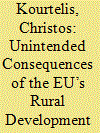

|
|
|
|
|
| Summary/Abstract |
After the Arab revolts, the EU designed a new regional rural development programme to address the various political and economic threats in the Arab Mediterranean countryside. Although the programme is based on a new cognitive framework, it has generated unintended consequences that undermine its effectiveness. These consequences were predictable. They are a product of path dependency and the inability of policymakers to draw lessons from previous EU initiatives with similar aims and to contextualise the relationship between small farmers and political elites in the Arab countryside.
|
|
|
|
|
|
|
|
|
|
|
|
|
|
|
|
|
|
|
|
|